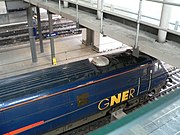| Great North Eastern Railway Ltd v Office of Rail Regulation | |
|---|---|
 | |
| Court | High Court of Justice |
| Citation | EWHC 1942 (Admin) |
| Keywords | |
| Rail | |
Great North Eastern Railway Ltd v Office of Rail Regulation EWHC 1942 (Admin) is a UK enterprise law case, concerning railways in the UK.
Facts
Great North Eastern Railway (GNER) claimed that the Office of Rail Regulation breached the Railways Infrastructure (Access and Management) Regulations 2005 Sch 3 para 1(1)(b) and the Railway Directive 2001/14 art 87(1) by giving it different charges on the East Coast Main Line. GNER was required to pay a fixed track charge £60.5m, which was 60% of its overall total track charges for 2005/06. Other companies with newer contracts, (First Hull Trains and Grand Central) were given a charge varying with network usage. GNER argued that they were equivalent parties, so that differences amounted to unlawful discrimination under Sch 3, para 1(1)(b), not enough to cover avoidable costs under para 1(4), and unlawful state aid.
Judgment
Sullivan J held that Office of Rail Regulation’s (ORR) approach was lawful, and it had a wide discretion to manage the network in the interests of passengers and make track access agreement. Operators should be able to pay costs and encouraged to use rail infrastructure. GNER was not providing comparable services. GNER could either enter the downstream rail passenger market by tendering a competitive bid, or by seeking open access. All routes were open without discrimination, so no distortion of competition could be inferred: HJ Banks & Co Ltd v Coal Authority (2001) C-390/98. Both parties had made it plain that a fixed charge would not have been viable. Further, the court should be very slow to intervene given the ORR’s expertise in the technical field of costing. There was no breach of the Directive article 87(1). Even if this was wrong, there would be no reason to quash the decision as GNER delayed making an application to court, and there was no real unfairness.
See also
| Rail sources | |
|---|---|
| Railways and Transport Safety Act 2003 ss 15-16, Sch 1 | |
| Railways Act 1993 ss 4-23 and 25 | |
| Single European Railway Directive 2012/34/EU | |
| Great North Eastern Railway Ltd v ORR EWHC 1942 | |
| Tamlin v Hannaford 1 KB 18 | |
| Greater London Authority Act 1999 ss 210-231 | |
| R (TfL) v London Regional Transport EWHC Admin 637 | |
| R (HS2 Action Alliance Ltd) v SS for Transport UKSC 3 | |
| Rail Passenger Rights Regulation 2007 arts 3-29 | |
| R (Save Our Railways) v Director of Rail CLC 596 | |
| Railways Act 2005 ss 19-21 and Schs 5-6 | |
| Railways Act 1993 ss 76-78 | |
| Railways Act 1993 ss 28-29 and GLAA 1999 s 174 | |
| Bromley LBC v Greater London Council UKHL 7 | |
| Railways Act 1993 ss 59-65 and Sch 6 (insolvency) | |
| Greater London Authority Act 1999 ss 220-224 and Schs 14-15 | |
| Winsor v Administrators of Railtrack Plc EWCA Civ 955 | |
| Weir v Secretary of State for Transport EWHC 2192 (Ch) | |
| Re Metronet Rail BCV Ltd EWHC 2697 (Ch) | |
| see UK enterprise law |
Notes
- "(On the Application of) Great North Eastern Railway Limited -v- Office of Rail Regulation: Witness Statement of Thomas Philip Winsor :: The Railways Archive". www.railwaysarchive.co.uk. Retrieved 3 March 2018.
- Citing R (London & Continental Stations & Property Ltd) v Rail Regulator EWHC 2607 (Admin)